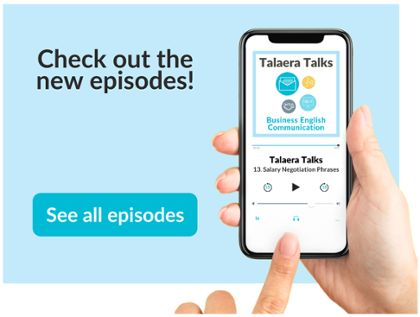By Paola Pascual on Jan 5, 2022 4:41:13 PM
Many people get confused with the words then and than –and it’s understandable! Why do they have to look so similar? They lead, in fact, to one of the most common mistakes among English learners. While you shouldn’t stress about minor mistakes, your conversations in English at work will be much more efficient the more grammatically correct they are.
If you learned English at school as a second language, you may remember complicated grammatical explanations, big words, and exercises that didn’t make so much sense. The goal of this article is to quickly clarify the difference between these two words –in plain language. We’ve also added a more official explanation as well in case you are a grammar connoisseur.
What is the difference between than and then?
These two words sound alike, but the spelling and use are different. The first tip you should remember is that if you are comparing two things, you will need THAN. If you are talking about time, you will need THEN. That’s it. Mystery solved.
Useful Trick: Use mnemonics or little tricks to remember the difference between these two. These can be silly, but they tend to help a lot. This is the one I use in this case:
- “Comparison” has the letter “A” and doesn’t have the letter “E” → THAN
- “Time” has the letter “E” and doesn’t have the letter “A” → THEN
While the rule above is an easy way to remember the difference, there is, indeed, a bit more to it. Let’s look at each word individually.
When to use than
In a nutshell: “Than” is used to introduce a comparison, an exception, or contrast. You will see it with expressions like more than, less than, better than, rather than, other than, no sooner… than, bigger than, etc.
Extended version: “Than” can be both a conjunction and a preposition (conjunctions are usually followed by a clause or a verb, while prepositions are usually followed by a noun).
Comparison. It is used to introduce the second element in a comparison.
- We are selling more now than we did last year.
- She speaks English much better than when she started working here.
- He was much more professional than the CEO.
- The situation is better than we thought.
- They gave us more than we had asked for.
Exception or contrast. You will also see it in expressions introducing an exception or contrast.
- They observed rather than act.
- He claims not to own anything other than this company.
Sequence. It also appears in expressions indicating that one action happened immediately after another.
- No sooner had she finished one project than she started a new one.
- No sooner had I arrived than the bell rang.
Popular expressions using than:
- Better late than never (Meaning: it is better to do something after the expected time than not do it at all)
- Better you than me (Meaning: I'm glad that I don't have to experience the bad situation you just mentioned)
- The pen is mightier than the sword (Meaning: an eloquent or well-crafted speech can be more influential than violence)
- Blood is thicker than water (Meaning: family is more important than anything else)
When to use THEN
In a nutshell: “Then” usually refers to a moment–at that time, after that, in that case. You will see it with expressions like since then, until then, see you then, back then, by then, now and then, then and there, every now and then, just then.
Extended version: “Then” is an adverb that usually indicates time, although it can also act as an adjective.
Time. At that time, at the time in question. You may also see the expression “then and there”, which means immediately.
- I was living in Berlin back then.
- It was then that I remembered.
- I’ll then have been working here for five years.
- By then, we may all be exhausted.
- We will try to buy some snacks if we have time before then.
- She made up her mind then and there
Afterwards. it is used to indicate that something happens next, afterwards, or subsequently.
- She closed the first deal and then the second one.
Consequence. It can indicate the result or consequence of an action. It is also used to finish off a conversation
- If we close the deal before Monday, then we can relax for the rest of the week.
- See you tomorrow then!
Practice the difference between than and then
Make sure the difference sticks with this simple exercise. Fill the gaps with the right word –than or then. If you are a Talaera student, complete this exercise on the platform to get immediate feedback. If you don't have access
- First, we'll go to New York; ___ we'll head for Costa Rica.
- I would rather work from home ___ at the office.
- Do you plan to join us ___?
- I will have a call with him, and ___ I will decide what to do.
- Her English skills are so much better ___ last year thanks to Talaera.
- The parcel they sent is heavier ___ the one they sent last year.
- Joe's writing skills were much worse back ___.
- We haven't seen her since ___.
- They only go to the office now and ___.
- This new computer has more memory ___ we ever thought possible.
Go to exercise on the Talaera platform.
Keep improving your communication skills for the workplace
Continue improving your communication skills for professional situations - get in touch with Talaera. If you wish to take your professional English communication skills to the next level, here are some valuable resources.
- Free webinars - monthly live sessions with one of our communication experts
- Free communication guides - keep developing your skills with our free ebooks on business English communication
For any additional information or questions, you can also reach out at hello@talaera.com. Interested in getting the best offers and receiving free content on Business English communication? Subscribe to our newsletter and we will keep you in the loop with offers, free events, and development materials!
If you enjoyed this article, keep reading:
- 7 Tips On How To Communicate Better With US Americans [Podcast]
- 'Stay safe' - How to Send Actually Genuine Emails During the Pandemic
- Useful Answers to Business English Top Questions - Expert Advice
- How To Learn The Difference Between 'Really' And 'Very'?
- 150+ Useful Email Phrases That Will Make Your Life Easier
- 14 Simple Rules That Will Make You A Better Communicator
- Learning Business English? +20 Top Tips You Need To Know





comments